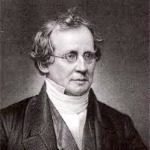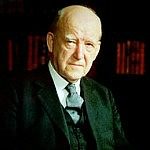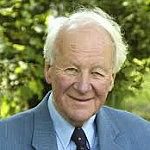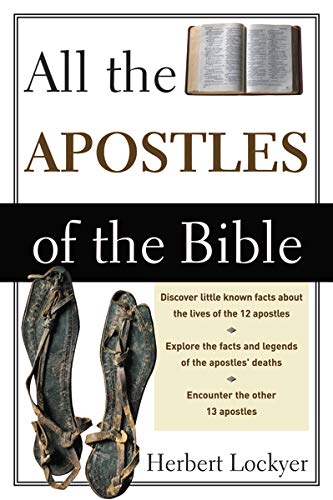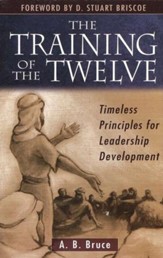Quotes about Apostles
What then were the apostles? It is plain from the divine record that they were men immediately commissioned by Christ to make a full and authoritative revelation of His religion; to organize the church; to furnish it with officers and laws, and to start it on its career of conquest through the world… The apostles, the twelve, stand out just as conspicuous as an isolated body in the history of the church, without predecessors, and without successors, as Christ Himself does. They disappear from history. The title, the thing itself, the gifts, the functions, all ceased when John, the last of the twelve, ascended to heaven.
I do not know what you feel, but I never cease to be grateful to these disciples. I am grateful for the record of every mistake they ever made, and for every blunder they ever committed, because I see myself in them. How grateful we should be to God that we have these Scriptures, how grateful to Him that He has not merely given us the gospel and left it at that. How wonderful it is that we can read accounts like this and see ourselves depicted in them, and how grateful we should be to God that it is a divinely inspired Word which speaks the truth, and shows and pictures every human frailty.
Spiritual Depression – Its Causes and its Cures, 1965, p. 137, Used by Permission from Elizabeth Catherwood (daughter). Get this book!
Apostles were chosen by God to work in the founding and forming of the church, after which time apostleship ceased. When all the apostles had died, the office of apostle no longer existed. They were selected, sent and empowered by God for that period in the history of the church, which was over when their lives were over. As the human founders and foundation of the church, the apostles had particular purposes and responsibilities.
In Christ’s day the world was filled with intellectuals and influential people. There were celebrated philosophers in Athens, unsurpassed scholars in Alexandria, the most powerful political leaders the world had ever known in Rome, and some of the most meticulous rabbis of all time in and around Jerusalem. Christ bypassed them all and called simple, crude, unknown, and uneducated fishermen from Galilee to be His disciples.
Six biblical reasons may be given as to why the apostolic office is not for today:
1. The church was founded upon the apostles (Eph. 2:20)… Their role was to give grounding, support, direction – to provide the underpinning for a fledgling church. They were the church’s founders. That role was fulfilled by them and by definition can never be repeated.
2. Apostles were eyewitnesses to the resurrection (1 Cor. 9:1)… There is no trustworthy evidence that (Jesus) has appeared to anyone since the close of the apostolic era.
3. Apostles were chosen personally by Jesus Christ (Mt. 10:1-4).
4. Apostles were authenticated by miraculous signs (Ac. 3:3-11; 5:15-16; 9:36-42; 20:6-12; 28:1-6)… No such miracles were ever performed – even in the apostolic era – by anyone other than the apostles and those commissioned by them.
5. Apostles had absolute authority (Jude 17)… When the apostles spoke, there was no discussion.
6. Apostles have an eternal and unique place of honor (Rev. 21:14).
I have always been fascinated with the lives of the twelve apostles. Who isn’t? The personality types of these men are familiar to us. They are just like us, and they are like other people we know. They are approachable. They are real and living characters we can identify with. Their faults and foibles, as well as their triumphs and endearing features, are chronicled in some of the most fascinating accounts of the Bible. These are men we want to know. That’s because they were perfectly ordinary men in every way. Not one of them was renowned for scholarship or great erudition. They had no track record as orators or theologians. In fact, they were outsiders as far as the religious establishment of Jesus’ day was concerned. They were not outstanding because of any natural talents or intellectual abilities. On the contrary, they were all too prone to mistakes, misstatements, wrong attitudes, lapses of faith, and bitter failure – no one more so than the leader of the group, Peter. Even Jesus remarked that they were slow learners and somewhat spiritually dense (Luke 24:25).
Yet with all their faults and character flaws – as remarkably ordinary as they were – these men carried on a ministry after Jesus’ ascension that left an indelible impact on the world. Their ministry continues to influence us even today. God graciously empowered and used these men to inaugurate the spread of the gospel message and to turn the world upside down (Acts 17:6). Ordinary men – people like you and me – became the instruments by which Christ’s message was carried to the ends of the earth. No wonder they are such fascinating characters.
Satan may even attempt to convince us that our shortcomings render us useless to God and to His church. But Christ’s choice of the apostles testifies to the fact that God can use the unworthy and the unqualified. He can use nobodies. They turned the world upside down, these twelve (Acts 17:6). It was not because they had extraordinary talents, unusual intellectual abilities, powerful political influence, or some special social status. They turned the world upside down because God worked in them to do it.
Why twelve? Why not eight? Why not twenty-four? The number twelve was filled with symbolic importance. There were twelve tribes in Israel. But Israel was apostate. The Judaism of Jesus’ time represented a corruption of the faith of the Old Testament. Israel had abandoned divine grace in favor of works-religion. Their religion was legalistic. It was shot through with hypocrisy, self-righteous works, man-made regulations, and meaningless ceremonies. It was heretical. It was based on physical descent from Abraham rather than the faith of Abraham. In choosing twelve apostles, Christ was in effect appointing new leadership for the new covenant. And the apostles represented the new leaders of the true Israel of God – consisting of people who believed the gospel and were following the faith of Abraham (cf. Romans 4:16). In other words, the twelve apostles symbolized judgment against the twelve tribes of Old Testament Israel.
Any honest evaluation of the New Testament evidence reveals that the apostles were a unique group of men, hand-picked and personally commissioned by the Lord Jesus Himself to lay the doctrinal foundation for the church, with Christ as the cornerstone. No one alive today can possibly meet the biblical criteria required for apostleship. And even in the first century, when all agree the miraculous gifts were fully operational, only a very select group of spiritual leaders were regarded as apostles.
First, it would be impossible for any contemporary Christian to meet the biblical qualifications required for someone to be considered an apostle. The New Testament articulates at least three necessary criteria: 1. an apostle had to be a physical eyewitness of the resurrected Christ (Acts 1:22; 10:39–41; 1 Cor. 9:1; 15:7–8); 2. an apostle had to be personally appointed by the Lord Jesus Christ (Mark 3:14; Luke 6:13; Acts 1:2, 24; 10:41; Gal. 1:1); and 3. an apostle had to be able to authenticate his apostolic appointment with miraculous signs (Matt. 10:1–2; Acts 1:5–8; 2:43; 4:33; 5:12; 8:14; 2 Cor. 12:12; Heb. 2:3–4).
When did the apostolic office cease? Right after the Apostle John penned the last words of Scripture. Shortly after Scripture was completed, the last living apostle died.
Charismatic Challenge by John Napier, Providence House Publishers, 2003, p. 63. Used by permission. All rights reserved.
[The Apostles] gave us the authoritative teaching by which the church continues to live to this day, and that is the only teaching we will need until Jesus returns. We know that new apostles won’t appear since Paul specifically says he was the last apostle (1 Cor. 15:8). And when James the brother of John died (Acts 12:2), he wasn’t replaced. Apostles, in the technical sense, are restricted to those who have seen the risen Lord and have been commissioned by Him, and no one since apostolic times fits such criteria. The apostles were uniquely appointed for the early days of the church to establish orthodox doctrine. There is no warrant, then, for saying there are still apostles today. Indeed, if anyone claims to be an apostle today we should be concerned, for such a claim opens the door to false teaching and to abuse of authority.
Why I Am a Cessationist, www.thegospelcoalition.org/article/cessationist Used by Permission from the Gospel Coalition. www.thegospelcoalition.org
The grandest era in the world’s history was ushered in by nobodies, by persons who, like their Leader, were despised and rejected of men.
What qualifications are essential for…apostleship?
1. Eye-Ear Witness to the Risen Christ: To be an apostle one must have both seen and heard the risen Christ. This is implied by Acts 1:21-22; 1 Corinthians 9:1, and 15:6-9. But simply seeing the risen Christ did not make someone an apostle, for many saw and heard Him (e.g. 1 Cor. 15:6) who were not apostles.
2. A Personal Call and Commission from Jesus: This is evident from the statements of Paul himself (Gal. 1:1; Rom. 1:1, 5; 1 Cor. 1:1; 2 Cor. 1:1; etc.).
Are Apostles for Today? November 6, 2006, www.enjoyinggodministries.com. Used by Permission.
There are other features or characteristics of apostolic ministry that must be noted. Whereas the presence of these factors does not make one an apostle, their absence may well call into question the authenticity of one’s claim to that office. One would be hard-pressed to find an apostle in the NT whose life was not characterized by these features:
1. Success in ministry (1 Cor.9:2; cf. 2 Cor. 3:1-3; [Paul appealed to the reality of their conversion as evidence of the authenticity of his apostolic calling]; but non-apostles also have great evangelistic success; see Philip in Acts 8).
2. Signs and Wonders (Ac. 5:12; Rom. 15:19; 2 Cor. 12:12; but non-apostles also performed signs and wonders; see Stephen in Acts 6 and Philip in Acts 8).
3. Extreme suffering (Col. 1:24; 2 Cor. 4:7-15; 11:23-33; etc.; certainly countless others also suffer).
4. Christ-like life and humility (2 Cor. 1:12; 2:17; 3:4-6; 4:2; 5:11; 6:3-13; 7:2; 10:13-18; 11:6,23-28; but there is no reason why a non-apostolic believer might not live at this same level of maturity).
5. Special insight into divine mysteries (Eph. 3:1-6; 1 Tim. 3:16; Rom. 11:25-32; 2 Cor. 12:1-4, 7).
6. Authority and the power to enforce it (Ac. 5:1-11; 1 Cor. 4:18-21; 5:5; 2 Cor. 10:8; 13:10; 1 Tim. 1:20).
7. God-orchestrated stigma (1 Cor. 4:9-13; 2 Cor. 6:3-10; 12:1-10). I often wonder if those who quickly accept the title of “Apostle” have bothered to read these texts, especially 1 Cor. 4:9-13.
Are Apostles for Today? November 6, 2006, www.enjoyinggodministries.com. Used by Permission.
It is widely assumed that an essential part of apostleship is the authority to write inspired Scripture. There are three problems with this view:
1. Scripture nowhere asserts that all apostles could write Scripture simply because they were apostles.
2. Several of the apostles did not, in fact, write Scripture. Does this disqualify them from being apostles?
3. People other than apostles did, in fact, write Scripture (Mark, Luke, the author of Hebrews, Jude).
Are Apostles for Today? November 6, 2006, www.enjoyinggodministries.com. Used by Permission.
This is the title which Jesus used for His special representatives or delegates. From the wiser company of disciples He chose twelve, named the “apostles,” and sent them out to preach (Lk. 6:13; Mk. 3:14). Thus they were personally chosen, called and commissioned by Jesus Christ, and authorized to teach in His name. The New Testament evidence is clear that this group was small and unique. The word “apostle” was not a general word which could be applied to every Christian like the words “believer,” “saint” or “brother.” It was a special term reserved for the Twelve and for one or two others whom the risen Christ had personally appointed. There can, therefore, be no apostolic succession, other than a loyalty to the apostolic doctrine of the New Testament. The apostles had no successors. In the nature of the case no one could succeed them. They were unique.
Taken from The Message of Galatians by John R.W. Stott. Copyright(c) 1968 John R. W. Stott. Used by permission of InterVarsity Press, PO Box 1400, Downers Grove, IL 60515, p. 13. www.ivpress.com. http://www.ivpress.com/cgi-ivpress/book.pl/code=288.
The apostles of Jesus Christ were unique – unique in their experience of the Jesus of history, unique in their sight of the risen Lord, unique in their commission by Christ’s authority and unique in their inspiration by Christ’s Spirit. We may not exalt our opinions over theirs or claim that our authority is as great as theirs. For their opinion and authority are Christ’s. If we would bow to His authority, we must therefore bow to theirs. As He Himself said, “He who receives you receives Me” (Mt. 10:40; Jn. 13:20).
Taken from The Message of Galatians by John R.W. Stott. Copyright(c) 1968 John R. W. Stott. Used by permission of InterVarsity Press, PO Box 1400, Downers Grove, IL 60515, p. 15-16. www.ivpress.com. http://www.ivpress.com/cgi-ivpress/book.pl/code=288.
Matthew suffered martyrdom by being slain with a sword at a distant city of Ethiopia.
Mark expired at Alexandria, after being cruelly dragged through the streets of that city.
Luke was hanged upon an olive tree in the classic land of Greece.
John was put in a cauldron of boiling oil, but escaped death in a miraculous manner, and was afterward banished to Patmos.
Peter was crucified at Rome with his head downward.
James, the Greater, was beheaded at Jerusalem.
James, the Less, was thrown from a lofty pinnacle of the temple, and then beaten to death with a fuller’s club.
Bartholomew was flayed alive.
Andrew was bound to a cross, whence he preached to his persecutors until he died.
Thomas was run through the body with a lance at Coromandel in the East Indies.
Jude was shot to death with arrows.
Matthais was first stoned and then beheaded.
Barnabas of the Gentiles was stoned to death at Salonica.
Paul, after various tortures and persecutions, was at length beheaded at Rome by the Emperor Nero.
As far as the apostles were concerned, they were as weak as any other men. They were uneducated, very ordinary men. Yet they are given this privileged position: they will deliver the Word of God through the Son to the world. From God the Father, through the Son, through the Spirit, and through the apostles to the world. In this sense, the apostles are “foundational” to the church… Theological and ethical instruction from the apostles is universally binding. Indeed, it is “from God to us.”
